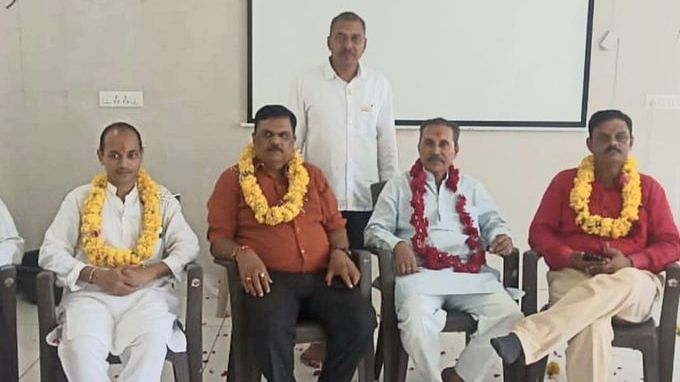Twenty-two years after a pregnant Bilkis Bano was gang raped by 12 men, the Supreme Court corrects its own egregious error and sends the 11 convicts back to prison. The Court recounts the other details of the gory crime, in the following words:
“The petitioner’s mother was gang raped and murdered, her cousin who had just delivered a baby was also gang raped and murdered. Eight minors including the petitioner’s cousin’s two-day-old infant were also murdered. The petitioner’s three-year-old daughter was murdered by smashing her head on a rock, her two minor brothers, two minor sisters, her uncles and aunt and three-cousins were all murdered.”
This was not the first time that the hapless Bilkis had to knock on the doors of the Supreme Court. She, with the aid of the National Human Rights Commission (NHRC), approached the Court to challenge the ‘closure’ of the case by the judicial magistrate in 2003, which had accepted the report of Gujarat Police that the accused could not be traced. The Supreme Court directed the re-opening of the case, and transferred it to the CBI. Then, in 2004, it accepted her plea to move the case out of Gujarat, transferring it to a Special Court in Mumbai. The life sentences to 11 men were finally upheld by the Supreme Court in 2017, but she still had to approach the Court for enhancement of the meagre compensation granted to her by the Bombay High Court. The Supreme Court granted her a compensation of Rs 50 lakh.
On 10 August 2022, the Gujarat government, under the cloak of the utterly wrong judgment of the Supreme Court passed on 13 May 2022, allowed the remission of sentences of all 11 convicts, setting them free after 15 years in jail.
As they walked out of jail, they were welcomed with sweets and garlands, and later greeted with garlands at the Vishwa Hindu Parishad (VHP) office. BJP MLA CK Raulji, one of the two BJP leaders who was part of the Gujarat government’s review panel that recommended releasing the rapists, stated: “I don’t know whether they committed any crime or not. But there has to be some intention of committing the crime… they are good people – Brahmins. And Brahmins are known to have good ‘sanskar’. It might have been someone’s ill intention to corner and punish them.”
Also read: ‘No error apparent’ — SC rejects Bilkis Bano’s review plea against premature release of 11 convicts
An error corrected
Bilkis Bano again had to approach the Supreme Court to challenge this remission. Monday’s judgment, which sent them back to jail, should hopefully bring closure. The Court’s May 2022 judgment had given liberty of seeking remission to one of the convicts, Radheshyam Bhagwandas Shah. But then, the other ten convicts also joined the bandwagon and approached the Gujarat government for remission. In fact, it was the Maharashtra government that was the “appropriate government”, since the trial was held in Maharashtra and the presiding judge of the trial court in Mumbai had to be necessarily consulted while granting remission. In giving the Gujarat Government the jurisdiction to decide the applications for remissions, the Supreme Court had acted contrary to its own earlier decisions on what the “appropriate government” would be in cases where the trial is held in a state different from the state in which the crime is committed.
Monday’s judgment, therefore, rightly calls its own 2022 judgment (by an earlier bench) a judgment per incuriam (which, in simple terms, means “in ignorance of the law”). The judgment also holds that the earlier judgment had been fraudulently obtained by the convict Radheshyam Bhagwandas Shah. This was because he had not disclosed that he had earlier approached the Gujarat High Court for a direction to the Gujarat government to consider his case for remission, that the Gujarat High Court had asked him to approach the Maharashtra government, and that he had in fact approached the Maharashtra government for remission. The court, therefore, calls its own earlier judgment a “nullity” and “non est in law”(which means, “does not legally exist”).
The Court also comes down heavily upon the Gujarat government for not seeking a review of the 2022 judgment, saying the state was “in tandem and complicit” with the convict who had fraudulently moved the top court. The Court also recalls that it was this conduct of the state that had led it on previous occasions to intervene in the “interest of truth and justice” by transferring the investigation to the CBI and the trial to the Special Court in Mumbai. The Court did not find it necessary to deal with at length the argument that the orders of remission suffered from non-application of mind because, as the Court said, the orders had been passed by the Gujarat government by usurping a power that it did not have.
An appeal to the Court as protector of liberty was made as a last-ditch argument by the convicts, saying that they had been out of jail for about a year and a half and should not be incarcerated again. The Court gave short shrift to this plea, saying that just as a person cannot be deprived of his liberty in accordance with the law, liberty cannot be protected in the face of breach of violation of the law. It asks an important question, a question so relevant in our dark and troubled times: “Can rule of law surrender to liberty earned as a consequence of its breach? Can breach of rule of law be ignored in order to protect a person’s liberty that he is not entitled to?”
The author is a senior advocate at the Supreme Court of India. Views are personal.
(Edited by Prashant)



